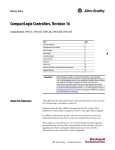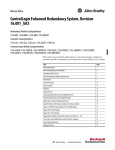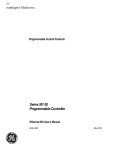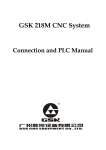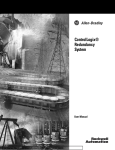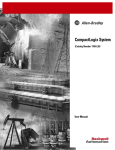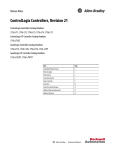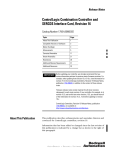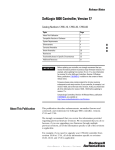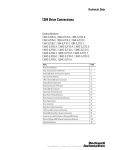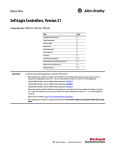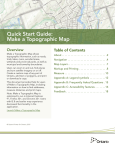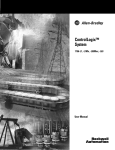Download 1756-RN017 - Rockwell Automation
Transcript
Release Notes 1756 ControlLogix Controllers, Revision 17 ControlLogix Controller Catalog Numbers 1756-L61, 1756-L62, 1756-L63, 1756-L64, 1756-L65 ControlLogix-XT Controller Catalog Number 1756-L63XT GuardLogix Controller Catalog Numbers 1756-L61S, 1756-L62S, 1756-L63S, 1756-LSP Topic Page About This Publication 2 Compatible Versions of Software 3 Before You Begin 3 Enhancements 4 Corrected Anomalies 8 Known Anomalies 23 Restrictions 28 Additional Memory Requirements 30 Additional Resources 34 IMPORTANT Before updating your controller, we strongly recommend that you review information pertinent to previous major firmware revisions. For example, when updating from revision 16.x to 17.x, view information for revision 16 in the ControlLogix Controllers, Revision 16 Release Notes, publication 1756-RN016, in addition to the content of these release notes. Firmware release notes contain material for all minor revisions subsequent to each major revision. If your controller, for example, is at revision 16.03, and not the last minor revision, 16.21, you should view all of the information for revision 16.03...16.21 before updating to revision 17.x. ControlLogix Controllers, Revision 16 Release Notes, publication 1756-RN016, are available at http://www.rockwellautomation.com/literature. 2 1756 ControlLogix Controllers, Revision 17 About This Publication This publication describes enhancements and anomalies (known and corrected) for ControlLogix controllers, revision 17. We strongly recommend that you review the information provided regarding previous firmware revisions. We recommend that you do so because, if you are upgrading your firmware through multiple previous revisions, all of the information specific to all of the revisions is applicable. For example, if you need to upgrade your 1756-L61 controller from revision 16.07 to 17.04, all of the information specific to revisions 16.07, 16.09, 16.20, 16.21, 17.02, 17.03, and 17.04 is applicable. About Publication 1756-RN017 This revision of the firmware release notes, 1756-RN017C, provides updated information specific to firmware revision 17.04 for all ControlLogix controllers. The previous revisions of this publication and the associated firmware revisions are listed in this table. Firmware Revisions Identified in Publication 1756-RN017 Pub. Revision Catalog No. Major and Minor Revision Nos. 1756-RN017A 1756-L61, 1756-L62, 1756-L63, 1756-L64, 1756-L65 17.02 1756-L61S, 1756-L62S, 1756-L63S, 1756-LSP 17.06 1756-L61, 1756-L62, 1756-L63, 1756-L64, 1756-L65 17.03 1756-L61S, 1756-L62S, 1756-L63S, 1756-LSP 17.07 1756-L61, 1756-L62, 1756-L63, 1756-L64, 1756-L65 17.04 1756-L61S, 1756-L62S, 1756-L63S, 1756-LSP 17.08 1756-RN017B 1756-RN017C Publication 1756-RN017C-EN-E - February 2010 1756 ControlLogix Controllers, Revision 17 IMPORTANT 3 Firmware revisions 17.02 (ControlLogix controllers) and 17.06 (GuardLogix controllers) are no longer available for download from the Rockwell Automation Technical Support website due to an issue with the firmware revisions. For more information about the issue, see Technical Support Knowledgebase ID 62845. Firmware revisions 17.03 (ControlLogix controllers) and 17.07 (GuardLogix controllers) are available from the Technical Support website and include all of the enhancements and corrected anomalies provided with firmware revisions 17.02 and 17.06, in addition to those indicated for 17.03 and 17.07 as described in these release notes. Compatible Versions of Software To use firmware revision 17, these minimum software versions are required. Software Required Version RSLinx Classic RSLinx Enterprise 2.54 (CPR 9, SR 1) 5.17 (CPR 9, SR 1) RSLogix 5000 17.00 (CPR 9, SR 1) RSNetWorx for ControlNet 9.00 (CPR 9, SR 1) RSNetWorx for DeviceNet RSNetWorx for EtherNet/IP Before You Begin Before you upgrade your firmware, please consider the following. IMPORTANT Loss of communication or power during a controller firmware flash upgrade may result in the controller’s rejection of the new firmware. If the controller firmware upgrade fails due to the conditions described, the following corrective actions may be required: • Cycle controller power and successfully complete the flash upgrade. • If a nonrecoverable fault occurs, then return the controller for factory repair. Publication 1756-RN017C-EN-E - February 2010 4 1756 ControlLogix Controllers, Revision 17 The following preliminary actions are required before upgrading your controller firmware. If Then Your controller is at revision 11 firmware or earlier You must first upgrade to revision 12 or 13 before attempting to upgrade to revision 17.x. Once you have your controller upgraded to revision 12 or 13 then you can upgrade the controller to revision 17.x. Your controller meets both of these conditions: Remove the CompactFlash card from the controller or check the Load Image option of the CompactFlash card. If it is set to On Power Up or On Corrupt Memory, first store the project with the Load Image option set to User Initiated. • It has nonvolatile memory • It is currently at revision 11.x or earlier Your controller is close to its limits of memory Otherwise, you may get a major fault when you update the firmware of the controller. This occurs because the On Power Up or On Corrupt Memory options cause the controller to load the project from nonvolatile memory. The firmware mismatch after the load then causes a major fault. This revision may require more memory than previous revisions. • To see what components of your current project require more memory, see page 30. • RSLogix 5000 software, version 13.0 or later, lets you estimate the memory requirements of the controller offline. To update to this revision, you may have to use a controller with a larger amount of memory. Your controller is connected to a DH-485 network Enhancements Disconnect it from the DH-485 network before you update the firmware of the controller. If you update the firmware of a controller while it is connected to a DH-485 network, communication on the network may stop. This enhancement is provided with firmware revisions 17.04 (ControlLogix controllers) and 17.08 (GuardLogix controllers). Enhancements with Revisions 17.04 and 17.08 Enhancement Description False Execution Time of Add-On Instructions Improved With previous revisions, the false execution time of an Add-On Instruction was dependent on the number of parameters (input, output, and inout) configured for the instruction. The more parameters configured, the longer the false execution time of the Add-On Instruction. With this revision, the false execution time of an Add-On Instruction is now constant if a scan false routine is not created. To determine the false execution time of Add-On Instructions based on your controller, reference the values published in the Logix5000 Controllers Execution Time and Memory Use Reference Manual, publication 1756-RM087. Lgx00091647 Publication 1756-RN017C-EN-E - February 2010 1756 ControlLogix Controllers, Revision 17 5 These enhancements were made available with previous firmware revisions 17.02 (ControlLogix controllers) and 17.06 (GuardLogix controllers). Enhancements with Revisions 17.02 and 17.06 Enhancement Description Runtime Detection of Controller Modifications Online changes to programs and data in a 1756-L6x ControlLogix controller can be tracked via an internal log with change counters. The log includes the type of change and the personal computer identity (Windows login) of the user who made the change. The change log can be stored on the controller’s CompactFlash card for offline review. Changes may also be monitored programmatically by reading the change log counter using a Get System Variable (GSV) instruction. Advanced Process Control Instructions Three new instructions targeted for process applications have been added. The new instructions are: • Internal Model Control (IMC) – Compares actual process error against error calculated by an internal first order lag plus deadtime model. • Coordinated Control (CC) – Controls a single process variable by manipulating as many as three different control variables. • Modular Multivariable Control (MMC) – Controls two process variables to their setpoints using up to three control variables. Instructions need to be purchased separately and licensed per use. The catalog numbers and associated use types are: - 9324-RLDAPCENE – provides a license to use the instructions in RSLogix 5000 and provides a license to use them in a single Logix controller. - 9324-RLDAPCCLENE - provides a license to use the instructions in an additional controller, pay-to-deploy. Runtime Partial Import You can now import programs, equipment phases, routines, rungs, and new Add-On Instructions into a running system. You can add these new components, as well as replace existing programs, equipment phases, and routines, while the system is running. New tags and User-Defined Types will be created as needed with values initialized from the import file. Data values of existing tags will be maintained. Publication 1756-RN017C-EN-E - February 2010 6 1756 ControlLogix Controllers, Revision 17 Enhancements with Revisions 17.02 and 17.06 Enhancement Description Added GuardLogix Safety Instructions Several new safety instructions are available with the use of RSLogix 5000 software, version 17 and GuardLogix controller firmware, revision 17. New instructions include: • Nine Metal Forming Instructions • Three Muting Instructions (for Light Curtains) • Six Dual Channel Instructions • A Safety Mat Instruction • A Configurable Redundant Output Instruction • A Two Hand Run Station Enhanced Instruction For more information about these and other safety instructions, see the GuardLogix Safety Application Instruction Set Safety Reference Manual, publication 1756-RM095. Kinetix6000 Advanced Safety Drive (S1) Support Version 17 provides support for the Kinetix6000 SERCOS S1 Advanced Safety based family of drives. The safety status can be directly accessed by the user’s application via two new SERCOS Axis attributes (GuardStatus and GuardFaults) in the Axis_Servo_Drive data type. The configuration of the S1 Drive’s safety parameters is done via an Ethernet WEB based interface and downloaded to the Kinetix6000 drive via this Ethernet connection. Kinetix6000 Enhanced Safe Torque-off Drive (S0) Support Version 17 provides support for the Kinetix6000 SERCOS S0 Enhanced Safety based family of drives. The safety status can be directly accessed by the user’s application via a bit attribute (SafeOff) in the Axis_Servo_Drive data type. Pause Management for Step Timer ACC The Logix5000 timers store a portion of the wall clock with each scan and compare this to the value from the last scan. The timer’s ACC value is updated by the difference. Previous to version 17, when a Sequential Function Chart (SFC) routine was paused and then released, all of the step timers jumped forward by the length of the pause time. Version 17 now provides an option to control how the step timers will treat the pause – ignore it or count the pause time. Reading SFC Chart Paused State via GSV Instruction The paused state of a Sequential Function Chart can be determined programmatically using the Get System Variable (GSV) instruction. Reading Safety Signature via GSV Instruction You can directly read the safety signature of a GuardLogix controller using the Get System Variable (GSV) instruction. Produced/Consumed Tag Structures Status Status information can be included with produced and consumed tags. In order to take advantage of this enhancement, the Produced/Consumed tag will need to be a User Defined Type (UDT) with the first member being of data type CONNECTION_STATUS. Note that RSNetWorx software, version 9.00.00 or later is required when scheduling a ControlNet network that has Produced/Consumed tags with status. Firmware support for 1756-L65 and 1756-L63S controllers. This firmware revision supports two new controllers - the ControlLogix 1756-L65 and the GuardLogix 1756-L63S controllers. For more information about the capabilities of these controllers, see ControlLogix Controllers Selection Guide, publication 1756-SG001. Added Extended Error Codes for MAOC Cam & Compensation array errors. For Error Codes 36 and 37, new Extended Error Codes are available for Output Cam array and Output Compensation array errors. The Extended Error Codes describe errors that may occur because the element is incorrectly configured or the value of one of its members is out of range. Publication 1756-RN017C-EN-E - February 2010 1756 ControlLogix Controllers, Revision 17 7 Enhancements with Revisions 17.02 and 17.06 Enhancement Description Support of Programmable Jerk for Multi-Axis Coordinated Move Instructions Support for programmable jerk has been extended to the multi-axis move instructions, that is, MCCM, MCLM, MCCD and MCS. You are now able to specify acceleration and deceleration jerk rates for the multi-axis coordinated moves directly via operands in the instruction faceplate for S-Curve profile motion for these instructions. The configurable maximum jerk rates are also accessible programmatically via the Get System Variable (GSV) and the Set System Variable (SSV) instructions. For project conversions, the new Jerk Operands are pre-populated in the MCLM, MCCM, MCCD and MCS instructions with default values for Jerk rate as 100% of time. Support for Programmable Jerk for Single-Axis Change Dynamics Instruction (MCD) The MCD instruction is used to Change the Speed, Acceleration and Deceleration of a running Single Axis Motion. Now with the Programmable Jerk, you can specify the Accel and Decel Jerk for S-Curve Profiles. Added ability to apply change dynamics to Active and Pending Motion A new enumeration, that is Active and Pending Motion, has been added to the Scope variable of the MCCD instruction. Choosing Active and Pending Motion specifies that the changes affect the motion dynamics of the active coordinated motion instruction and any pending coordinated motion instruction in the queue. Publication 1756-RN017C-EN-E - February 2010 8 1756 ControlLogix Controllers, Revision 17 Corrected Anomalies These anomalies have been corrected in controller firmware revisions 17.04 (ControlLogix controllers) and 17.08 (GuardLogix controllers). Anomalies Corrected with Revisions 17.04 and 17.08 Cat. No. Firmware Revision Description 1756-L55Mxx, 1756-L61, 1756-L62, 1756-L63, and 1756-L64 17.04 A Digital Alarm (ALMD) configured to trigger when the input condition of the alarm is false does not trigger if the alarm condition is false when you conduct a download or return to Run mode. 1756-L61S, 1756-L62S, 1756-L63S 17.08 When the Condition parameter of the ALMD instruction is not set (that is, Input = 0) and either the program has recently been downloaded to the controller, or the controller has been changed from Run to Program and back to Run mode, the alarm is not activated (that is, the InAlarm bit is not set). These behaviors may result, depending on your application: • Programming designed to respond to the activated alarm is not executed. • Messages designed to be indicated at the operator station in response to the activated alarm are not indicated. • The alarm’s history log does not indicate that the alarm was activated. If you choose not to upgrade to this revision, you must toggle the Condition parameter from set (that is, Input = 1) to not set (that is, Input = 0) to activate the alarm. If your Condition parameter is set, then the alarm activates as expected after you download or change the controller mode. Lgx000104435 Publication 1756-RN017C-EN-E - February 2010 1756 ControlLogix Controllers, Revision 17 9 Anomalies Corrected with Revisions 17.04 and 17.08 Cat. No. Firmware Revision Description 1756-L55Mxx, 1756-L61, 1756-L62, 1756-L63, and 1756-L64 17.04 Online edits result in major non-recoverable faults (MNRFs). 1756-L61S, 1756-L62S, 1756-L63S 17.08 Causes of this anomaly include: • a controller that was or is near its limits in memory. • doing many online edits (tag additions and deletions) without downloading again. • using RSLinx Enterprise software (CPR9). When this anomaly occurs, the controller generates a major non-recoverable fault during an online edit (tag additions and deletions). I/O goes to their configured safe state, and the user application is cleared from memory. At this point, a Code 1 Type 60 or 61 major fault will be logged in the controller. This requires you to download the application again. When online edits are made to a controller, RSLinx Enterprise software (CPR9) monitors them. When a large number of edits are made to a controller, RSLinx Enterprise software (CPR9) re-optimizes communication to the controller. Two anomalies in RSLinx Enterprise software (CPR9) are aggravating factors to this controller anomaly. • The algorithm used to determine if communication re-optimization is needed causes communication re-optimization to occur too often. • When the communication re-optimizations occur, the connections to the controller should close. However, these connections do not close. This causes the controller to orphan all information related tags on scan by RSLinx Enterprise software (CPR9). You must upgrade your controller firmware and apply RSLinx Enterprise patches. The RSLinx Enterprise patches reduce the likelihood of the controller faulting and remove the excessive memory consumption. The firmware upgrade eliminates the controller major non-recoverable faults caused by this anomaly. These RSLinx Enterprise patches are on the Rockwell Automation Knowledgebase, http://www.rockwellautomation.com/knowledgebase: • RSLinx Enterprise software version 5.00 CPR9, ID number 65818 • RSLinx Enterprise software version 5.17 CPR9 SR1, ID number 65819 • RSLinx Enterprise software version 5.20 CPR9 SR2, ID number 65820 Lgx00096513 Publication 1756-RN017C-EN-E - February 2010 10 1756 ControlLogix Controllers, Revision 17 Anomalies Corrected with Revisions 17.04 and 17.08 Cat. No. Firmware Revision Description 1756-L55Mxx, 1756-L61, 1756-L62, 1756-L63, and 1756-L64 17.04 Fault handlers can be defined at the controller and program scope levels. These fault handlers are typically used to handle major recoverable faults that can occur during runtime execution of an application due to programming errors. A typical example of this would be handling indirect addressing that has gone out of range; MyTag[index], where index is larger than the size of the array. 1756-L61S, 1756-L62S, 1756-L63S 17.08 Faults can also be handled by the controller during pre-scan of the controller program on the transition to Run mode. Again, for example, the handling of indirect addressing that has gone out of range. There is an anomaly when these methods attempt to handle a fault. These are the possible ways the anomaly can manifest itself: • The controller will experience a major non-recoverable fault. I/O goes to their configured safe state, and the user application is cleared from memory. At this point, a Code 1 Type 60 or 61 major recoverable fault will be logged in the controller. This requires you to redownload the application. • Tag data corruption. • Online saving or uploading failures. • Anomalous program execution. For example, if a rung is being scanned false and there is an instruction that has false execution, the fault handler executes so the remainder of the rung will scan true. In the example below, the OTE instruction has an index out of range. After returning from the fault handler, the ADD instruction will execute, even though the rung input conditions are false. Lgx00106482, Lgx00100765, Lgx00097014 Publication 1756-RN017C-EN-E - February 2010 1756 ControlLogix Controllers, Revision 17 11 This table lists anomalies corrected with previous revisions. Corrected Anomalies with Previous Revisions Cat. No. Firmware Anomaly Revision Description 1756-L61, 1756-L62, 1756-L63, 1756-L64, 1756-L65 17.03 When a controller changes from RUN mode to a non-RUN mode state, that is to PROGRAM mode or a recoverable faulted state, the controller’s outputs may not transition to their predefined PROGRAM mode state. 1756-L61S, 1756-L62S, 1756-L63S 17.07 Outputs remotely located via a network may not go to their predefined PROGRAM mode state on a change out of RUN mode Any of the following transitions from RUN mode to a non-RUN mode may cause this anomaly to occur: • The key switch on the controller is turned from RUN mode to PROGRAM mode. • A remote command is sent to the controller to change from RUN mode to PROGRAM mode • The controller detects a major recoverable fault that causes an operating mode change from RUN mode to a faulted mode. If your experience a major non-recoverable fault on your controller, the controller’s outputs will transition to their predefined fault mode state. Lgx00099405 1756-L61, 1756-L62, 1756-L63, 1756-L64, 1756-L65 17.03 1756-L61S, 1756-L62S, 1756-L63S 17.07 1756-L61, 1756-L62, 1756-L63, 1756-L64, 17.02 1756-L61S, 1756-L62S, 1756-L63S 17.06 The CONNECTION_STATUS.RunMode indication in a Produced tag may not indicate correctly. When using Produced/Consumed tags with CONNECTION_STATUS, the CONECTION_STATUS.RunMode indication in the producing controller may not indicate correctly if it is not in RUN mode. The CONNECTION_STATUS.RunMode indication in the Consuming controller will indicate correctly. Lgx00099405 Setting the message timeout bit (.TO) causes a major nonrecoverable fault (MNRF). Setting a message timeout bit (.TO) in the message control structure while the message is active may result in a MNRF on the controller. To avoid causing a MNRF, do not change the message timeout bit (.TO). Instead, change the values for the unconnected timeout (.UnconnectedTimeout) and connection rate (.ConnectionRate) in the message control structure. For more information about changing the values in the message control structure, see the Logix5000 Controllers General Instruction Reference Manual, publication 1756-RM003. Lgx00098991 Publication 1756-RN017C-EN-E - February 2010 12 1756 ControlLogix Controllers, Revision 17 Corrected Anomalies with Previous Revisions Cat. No. Firmware Anomaly Revision Description 1756-L61, 1756-L62, 1756-L63, 1756-L64 17.02 If you have stored your program on a CompactFlash card, then remove the CompactFlash card while power is off without replacing it, attempts to upgrade the controller firmware are unsuccessful. Firmware upgrades using the ControlFlash utility are unsuccessful if the CompactFlash card is removed. Re-inserting the CompactFlash card restores the ability to upgrade firmware. Lgx00073863 1756-L61, 1756-L62, 1756-L63, 1756-L64, 17.02 1756-L61S, 1756-L62S, 1756-L63S 17.06 1756-L61, 1756-L62, 1756-L63, 1756-L64, 17.02 1756-L61S, 1756-L62S, 1756-L63S 17.06 Serial-port control structure bit RN inaccurately cleared. This anomaly occurs when using firmware revision 16.20 or later. If the ACL instruction is used to clear instructions from the ASCII queue, the serial-port control structures’ RN bit is cleared (that is, the RN bit is set to zero) although it should not be. Lgx00081063 Use of revision 16 firmware and the controller serial port results in extended program scan times. If you use firmware at revision 16, including revisions 16.02…16.21, and the controller’s serial port, the program scan time may increase. The program scan-time increase in revision 16 may be 2…10 times the scan time of the same program with revision 15. With revision 17, program scan times have been reduced from 2…10 times to 1.5…6 times the scan time of the same program executed in revision 15. Lgx00077845 1756-L61, 1756-L62, 1756-L63, 1756-L64, 17.02 1756-L61S, 1756-L62S, 1756-L63S 17.06 1756-L61, 1756-L62, 1756-L63, 1756-L64, 17.02 1756-L61S, 1756-L62S, 1756-L63S 17.06 Indirectly addressing an instance When an indirectly-addressed instance tag is used instead of a tag in an Add-On Instruction results directly- addressed instance tag within an Add-On Instruction, a Major in a Major Non-Recoverable Fault. Non-Recoverable Fault occurs. Typically the major fault occurs during the prescan of the controller. Lgx00077261, Lgx00076136 Serial messages broadcast from a master controller to station address 255 results in other messages failing. Publication 1756-RN017C-EN-E - February 2010 When two controllers are used in a master/slave configuration and the message to the broadcast station address (255) is executed, that message errors. Some messages occurring after the message addressed to address 255 also error with the same error code. Lgx00079116 1756 ControlLogix Controllers, Revision 17 13 Corrected Anomalies with Previous Revisions Cat. No. Firmware Anomaly Revision Description 1756-L61, 1756-L62, 1756-L63, 1756-L64, 17.02 You may get the error “Parameter out of Range” if the MRP is executed when: 1756-L61S, 1756-L62S, 1756-L63S 17.06 Motion Redefine Position (MRP) Error 13 for Positions within the range. Current Position + MRP Position > 231/Axis Conversion Constant. Or Current Position + MRP Position <- 231/Axis Conversion Constant. For example, assume that the: • axis conversion constant = 120,000.0 feedback counts/1.0 unit. • current command position = 17,893.0 units. If you MRP with a position of five units, which exceeds 231/Axis Conversion Constant, the MRP will error. Lgx00073719 1756-L61, 1756-L62, 1756-L63, 1756-L64, 17.02 1756-L61S, 1756-L62S, 1756-L63S 17.06 1756-L61, 1756-L62, 1756-L63, 1756-L64, 17.02 1756-L61S, 1756-L62S, 1756-L63S 17.06 1756-L61, 1756-L62, 1756-L63, 1756-L64, 17.02 1756-L61S, 1756-L62S, 1756-L63S 17.06 1756-L61, 1756-L62, 1756-L63, 1756-L64, 17.02 1756-L61S, 1756-L62S, 1756-L63S 17.06 SSV of MotionGroup Average Scan Time causes a jump in scan time. If an SSV instruction with a value of zero is executed against the MotionGroup attribute TaskAverageScanTime, then a GSV instruction is executed. The average scan time jumps to an incorrect value. The larger the Coarse Update Period, the larger the jump will be. For example, with a Coarse Update Period of 26 ms, the average scan-time value can increase to over 300 ms. Lgx00071520 Axis ActualAcceleration tag is not updated for virtual axes. For the virtual axis, the Axis_tag.ActualAcceleration does not update, but the Axis_tag.CommandedAcceleration does. The actual acceleration is now updated for a virtual axis. Lgx00073829 MCT error 61 with extended error 10 for zero length moves. You will get Error 61 with Extended Error 10 if you execute an MCT instruction on the same interaction as the .PC bit for a Motion Coordinated Linear Move (MCLM) or Motion Coordinated Circular Move (MCCM) is set for a zero length move, indicating that axes are moving or locked by some other operation. Lgx00075286 Setting invalid home sequence value via SSV instruction. Attempting to program an SSV instruction to set the home sequence to Torque or Torque Marker on a non-SERCOS drive produced a minor controller fault on any subsequent attempt to program this attribute via an SSV instruction. Lgx00068281 Publication 1756-RN017C-EN-E - February 2010 14 1756 ControlLogix Controllers, Revision 17 Corrected Anomalies with Previous Revisions Cat. No. Firmware Anomaly Revision Description 1756-L61, 1756-L62, 1756-L63, 1756-L64, 17.02 Duration cams enable an application to turn an output on at a specific position and off after the configured Duration time. Latch and unlatch delays adjust the point at which an output turns on and off, regardless of axis speed. 1756-L61S, 1756-L62S, 1756-L63S 17.06 Duration Cam - Latch and Unlatch Delays A positive latch delay time should extended your Duration time but instead shortens it. Additionally, a positive unlatch delay time should shorten your Duration time but instead extends it. The converse is also true. A negative latch delay time should shorten your Duration time but instead extends it. Additionally, a negative unlatch delay time should extend your Duration time but instead shortens it. If you execute a latch and unlatch delay for the identical value, no anomaly occurs, and the output remains on for the configured Duration time. Lgx00068599 1756-L61, 1756-L62, 1756-L63, 1756-L64, 17.02 1756-L61S, 1756-L62S, 1756-L63S 17.06 The Slot Status bit for an I/O connection is slow to update if the connection is lost. When using I/O on an Ethernet network, if the connection to the network is lost at the adapter, the SlotStatusBit for that connection will not register the disconnect for 9 seconds or more. If you require loss-of-connection data more quickly than the 9 seconds, use the GSV instruction to monitor the entry status of the connection as it updates more quickly than the SlotStatusBit. Lgx00072696 1756-L61, 1756-L62, 1756-L63, 1756-L64, 17.02 1756-L61S, 1756-L62S, 1756-L63S 17.06 When the SFC instruction’s Last Scan of Active Steps option is set to Automatic Reset, a Major Non-Recoverable Fault occurs. A Major Non-Recoverable Fault may occur when these elements are present in the program: • Within an SFC, a JSR instruction is used to jump to another SFC, also know as a nested SFC. • One or more of the nested SFC instructions contains Simultaneous Branches. • The Last Scan of Active Steps option (specified in the SFC Execution tab of the controller Properties dialog) is set to Automatic Reset. To avoid a Major Non-Recoverable Fault when these elements are present, set the Last Scan of Active Steps to Don’t Scan or to Programmatic Reset. Lgx00072702 Publication 1756-RN017C-EN-E - February 2010 1756 ControlLogix Controllers, Revision 17 15 Corrected Anomalies with Previous Revisions Cat. No. Firmware Anomaly Revision Description 1756-L61, 1756-L62, 1756-L63, 1756-L64, 17.02 This anomaly occurs only if the SFC Last Scan of Active Steps option is set to Programmatic Reset or Automatic Reset. When the default, Don’t Scan, is set, the anomaly does not occur. 1756-L61S, 1756-L62S, 1756-L63S 17.06 An SFC R action continues to post-scan on the specified action. The intention of a reset action, type R, is to terminate the execution of another action that was previously stored. When configured as described above, the reset action causes logic to execute a final scan. The reset action does not check to verify that an action is stored before it completes the final scan. As a result, each time the reset action is scanned, the target logic will be scanned one last time. These observable behaviors may result: • The timer of the stored action will continue to time even though the action is no longer active. • The logic in the stored action will be executed in the configured mode. • At Automatic Reset, non-retentive outputs are cleared. • At Programmatic Reset, the logic will execute. In this situation, the action logic checks for the final scan condition (action.A = 1 and action.Q = 0) and performs some shutdown operations. This is the code that will be executed. Lgx00069295 1756-L61, 1756-L62, 1756-L63, 1756-L64, 17.02 1756-L61S, 1756-L62S, 1756-L63S 17.06 Attempts to download a program to a controller following a failed firmware upgrade are successful. (Failure is indicated by the OK status indicator flashing red after the upgrade is complete.) After a firmware upgrade attempt fails during the upgrade (for example, the cable is disconnected or communication is interrupted), the controller's OK status indicator flashes red and any user attempts to clear the fault by toggling the controller's keyswitch are unsuccessful. You can download a program to the controller, place the controller in Run mode, and run the program (the RUN status indicator displays run status). The outputs behave as specified by the program. However, when controller power is cycled, the program is lost and the controller properties indicate a firmware revision different from that most recently downloaded to the controller. Lgx00071250 Publication 1756-RN017C-EN-E - February 2010 16 1756 ControlLogix Controllers, Revision 17 Corrected Anomalies with Previous Revisions Cat. No. Firmware Anomaly Revision Description 1756-L61, 1756-L62, 1756-L63, 1756-L64, 17.02 An anomaly occurs when you pass a tag based on a User-defined Data Type (UDT) into an Add-On Instruction, and certain conditions are met that result in a Major Recoverable Fault or memory corruption. 1756-L61S, 1756-L62S, 1756-L63S 17.06 Passing a User-defined Data Type (UDT) into an Add-On Instruction results in a Major Recoverable Fault or data memory corruption. These conditions are required for Major Recoverable Fault or data memory corruption: • A one-dimensional array tag that is based on a UDT that is passed into the Add-On Instruction. • The UDT tag contains a member that is a one-dimensional array. • Inside the Add-On Instruction, an operand address that specifies an immediate member of the UDT tag array and a variable element of the member array (for example, array[0].memberArray[x] is used). Examples: UDT array[0].memberArray[x] When the size of the UDT array is smaller than that of the memberArray and the [x] value of the memberArray is larger than the size of the UDT array, a Major Recoverable Fault Code 4 Type 20 occurs. UDT array[0].memberArray[x] When the size of the UDT array is bigger than the memberArray and the [x] value is smaller than the size of the UDT Array but larger than the size of the memberArray, the expected fault does not occur and the data is written to a location outside the bounds of the memberArray. Lgx00077270 and Lgx00076136 1756-L61, 1756-L62, 1756-L63, 1756-L64, 17.02 1756-L61S, 1756-L62S, 1756-L63S 17.06 An upload of an Add-On Instruction When an Add-On Instruction containing a literal value for one of its with a literal Boolean input Boolean input parameters is referenced from a Ladder Diagram routine, parameter modifies offline image. an upload of the project will modify the display of the literal value by appending a “.0”. Each time the project is downloaded and re-uploaded, another “.0” is appended, so that after the second download/upload sequence, the project file will not verify and can no longer be downloaded without first editing the modified literal value. The edit may be successfully performed either online or offline. Note, however, that when editing online, because the rung is in an unverified state, the “Finalize All Edits in Program” will not operate. In this case, use of the Accept/Test/Assemble sequence of operations will allow the edit to be completed. This condition does not affect the executing image, which will continue execution using the unmodified literal value. To avoid exposure to this problem, replace the literal value with a reference to a tag having the desired value. Lgx00077802 Publication 1756-RN017C-EN-E - February 2010 1756 ControlLogix Controllers, Revision 17 17 Corrected Anomalies with Previous Revisions Cat. No. Firmware Anomaly Revision Description 1756-L61, 1756-L62, 1756-L63, 1756-L64, 17.02 If an alarm has an active status (InAlarm tag is true) and is unacknowledged (InAlarmUnack is true), acknowledging the alarm does not reset the alarm's unacknowledged tag (that is, even after being acknowledged, the InAlarmUnack continues to be true). 1756-L61S, 1756-L62S, 1756-L63S 17.06 Acknowledging an analog or digital alarm does not clear the alarm's unacknowledged (InAlarmUnack) tag. This anomalous behavior occurs with both digital (ALMD) and analog (ALMA) alarms. Lgx00081999 1756-L61, 1756-L62, 1756-L63, 1756-L64, 17.02 1756-L61S, 1756-L62S, 1756-L63S 17.06 1756-L61, 1756-L62, 1756-L63, 1756-L64, 17.02 1756-L61S, 1756-L62S, 1756-L63S 17.06 1756-L61, 1756-L62, 1756-L63, 1756-L64, 17.02 1756-L61S, 1756-L62S, 1756-L63S 17.06 1756-L61, 1756-L62, 1756-L63, 1756-L64, 17.02 1756-L61S, 1756-L62S, 1756-L63S 17.06 Writing 483 SINT values to another If you attempt to write 483 SINT values to another controller by using a controller using a MSG instruction MSG instruction, an error occurs. This anomalous behavior does not causes an error. occur with any other amount of SINT values (for example, attempting to write 482 or 484 SINT values to the other local controller does not cause this anomaly). Lgx00057515 Message errors may occur when using a CIP data table read or write message. If you perform a CIP data table read or write message to another controller with User-defined Data Types (UDTs), the message instructions may error with code 16#001F (extended error code 16#203). Lgx00083193 Attempts to rename Alias tags for bits within in a DINT referenced by an HMI are unsuccessful. If your HMI references any bit of a DINT and you try to rename Alias tags for bits 0...7 within that DINT, the new alias name fails to be set. Attempting to rename Alias tags for bits 8 and higher is successful. Lgx00079805 Use of certain Function Block instructions causes various minor faults. The use of these Function Block instructions may result in various minor faults when your program executes; BAND, BOR, BNOT, BXOR, CTUD, D2SD, D3SD, DFF, JKFF, OSFI, OSRI, RESD, SETD, TONR, TOFR, RTOR, and OSC. The minor faults result because the Overflow status flag (S:V) is set each time an instruction listed above is carried out. Lgx00045364, Lgx00028500 Publication 1756-RN017C-EN-E - February 2010 18 1756 ControlLogix Controllers, Revision 17 Corrected Anomalies with Previous Revisions Cat. No. Firmware Anomaly Revision Description 1756-L61, 1756-L62, 1756-L63, 1756-L64, 17.02 Normally, if in an SFC where the configuration of the last scan is set to Automatic Rest, the code of associated actions are executed a final time and the scan mode is set to postscan. Postscan execution is a system-defined mode similar, but not the same as, prescan. 1756-L61S, 1756-L62S, 1756-L63S 17.06 Nested SFCs, when configured to Automatic Reset, are prescanned rather than postscanned. With this anomaly, if an action in the SFC contains a JSR to another SFC, the suburoutine is prescanned rather than postscanned (that is, the incorrect scan mode is set). Many instructions, especially motion instructions, remain inactive during a postscan, but re-initialize during a prescan. Lgx00086725 1756-L61, 1756-L62, 1756-L63, 1756-L64, 17.02 1756-L61S, 1756-L62S, 1756-L63S 17.06 1756-L61, 1756-L62, 1756-L63, 1756-L64, 17.02 1756-L61S, 1756-L62S, 1756-L63S 17.06 The SPCascadeInv value of a PIDE instruction is set any time SPCascade exceeds the SP limits. When the AllowCasRat and UseRatio tags are set, the SPCascadeInv should be set only if SPCascade multiplied by the ratio value exceeds the SP limits. However, the SPCascadeInv is set any time SPCascade exceeds the SP limits. SPCascade is set even when the setpoint (SPCascade multiplied by the ratio value) is below SP limits. Lgx00065664 Setting the WALLCLOCKTIME object may result in a Major Nonrecoverable Fault (MNRF) or an incorrect WALLCLOCKTIME value. Using an SSV instruction to set the local controller's WALLCLOCKTIME using the LocalDateTime attribute may result in an incorrect WALLCLOCKTIME value upon execution of the program. This incorrect time is usually evident in the seconds field. The discrepancy in the WALLCLOCKTIME may also result in a MNRF during controller power down or just after controller power has been cycled. To avoid this behavior, use the DateTime attribute and arithmetic to handle the GMT offset instead of using the LocalDateTime attribute to set the local controllers WALLCLOCKTIME object. Lgx00078925 1756-L61, 1756-L62, 1756-L63, 1756-L64, 17.02 1756-L61S, 1756-L62S, 1756-L63S 17.06 Totalizer (TOT) instruction may continually remain in Program Mode. Publication 1756-RN017C-EN-E - February 2010 Setting the ProgValueReset input puts the Totalizer into Program Mode. The ProgOper output continues to indicate the mode requested (that is, Operator mode), however, only ProgStartReq, ProgStopReq and ProgResetReq are recognized. Lgx00077908 1756 ControlLogix Controllers, Revision 17 19 Corrected Anomalies with Previous Revisions Cat. No. Firmware Anomaly Revision Description 1756-L61, 1756-L62, 1756-L63, 1756-L64, 17.02 1756-L61S, 1756-L62S, 1756-L63S 17.06 An MAOC instruction used in conjunction with an 1756-OB16IS Scheduled Output Module can overwrite memory if 1756-OB16IS module is not configured with the default communications format “Scheduled Output Data per Point”. If the format is changed to either “Listen Only – Output Data” or “Output Data”, the memory allocated for the schedule data used by the MAOC instruction is not present. 1756-L61, 1756-L62, 1756-L63, 1756-L64, 17.02 1756-L61S, 1756-L62S, 1756-L63S 17.06 An MAOC in conjunction with an 1756-OB16IS Scheduled Output Module can overwrite memory. Lgx00082622 Jerk parameters of master offset move are incorrectly computed. The Master Offset Moves are used to offset the Position cams. The Jerk parameters of the Master offset Move using a MAM instruction are incorrectly applied if the conversion constant of the master and the slave are different. The slave axis conversion constant is applied instead of the master axis conversion constant for master offset move. Lgx00081390 1756-L61, 1756-L62, 1756-L63, 1756-L64, 17.02 1756-L61S, 1756-L62S, 1756-L63S 17.06 Motion Stop issues if Program Stop If MCLM or MCCM instructions are in process and the controller Action is Hard disable for a transitions to Program Mode, the system’s transition takes longer than expected for the axes to stop. Your controller experiences this issue Virtual Axis. only if the Program Stop Action configured in the axis properties is set to Hard Disable. With the corrected behavior in this release, the transition to the program mode is immediate. Lgx00077357 1756-L61, 1756-L62, 1756-L63, 1756-L64, 17.02 1756-L61S, 1756-L62S, 1756-L63S 17.06 Prevent execution of Motion Instructions while an MGS, MAS-ALL or MCS-All instruction is executing. Previously, if certain Motion Instructions overlapped while Motion Stop Instructions were active, your application experiences unexpected behavior. When an instruction is actively stopping and a second instruction is initiated that overlaps the active instruction you see this anomaly. With firmware revision 17.02, if certain Motion Instructions overlapped while Motion Stop Instructions are active, you see Error Code #78. For more information about Error Code #78 and the affected Motion Instructions, see the Error Codes for Motion Instructions Appendix of the Logix5000 Controllers Motion Instructions Reference Manual, publication 1756-RM007. Lgx00083819 Publication 1756-RN017C-EN-E - February 2010 20 1756 ControlLogix Controllers, Revision 17 Corrected Anomalies with Previous Revisions Cat. No. Firmware Anomaly Revision Description 1756-L61, 1756-L62, 1756-L63, 1756-L64, 17.02 1756-L61S, 1756-L62S, 1756-L63S 17.06 A non-recoverable fault is caused by a very unlikely and unexpected combination of initial conditions when velocity = 0 and acceleration < > 0. The only way to achieve this combination of initial conditions is to stop the axis with an MAS instruction (Speed = 0) or an MCD instruction (Speed = 0) and to start the motion exactly one iteration before the MAS instruction or MCD instruction is complete. 1756-L61, 1756-L62, 1756-L63, 1756-L64, 17.02 1756-L61S, 1756-L62S, 1756-L63S 17.06 Parameter Combination Caused Non-Recoverable Fault on Controller. Lgx00082075 An armed MAOC will remain armed If an MAOC instruction is armed when a system power cycle occurs, during a system power cycle. the MAOC will remain armed at power up. The MAOC instruction may become disarmed if a physical axis fault is detected. Additionally, the MAOC instruction may cause a group overlap fault if a physical axis reports a large delta position during power-up. Lgx00085513 1756-L61, 1756-L62, 1756-L63, 1756-L64, 17.02 1756-L61S, 1756-L62S, 1756-L63S 17.06 1756-L61, 1756-L62, 1756-L63, 1756-L64, 17.02 1756-L61S, 1756-L62S, 1756-L63S 17.06 Execution time change for some motion instructions. With controller firmware revision 17.02, there is a change in the instruction execution times for numerous motion instructions. For more information on execution times, see the Logix5000 Controllers Execution Time and Memory Use Reference Manual, publication 1756-RM087. Lgx00085687 Axis experiences unwanted motion on rotary axis. You may experience unwanted motion if your application has the following conditions: • The axis is a rotary axis. • The axis position was less than 1/2 drive count away from unwind. • An MRP instruction was executed with a commanded position of zero. Lgx00078215 1756-L61, 1756-L62, 1756-L63, 1756-L64, 17.02 1756-L61S, 1756-L62S, 1756-L63S 17.06 Base Offset X1b with a negative value in Delta gives MCT Error 61 Exerr 15 For a 2 & 3 axes Delta robot, you can now use both negative and positive values for the X1 Base Offset. For both of these 2 Delta robot geometries, an error is now forced if: Publication 1756-RN017C-EN-E - February 2010 L1 + X1b-x1e > L2 Lgx00083890 1756 ControlLogix Controllers, Revision 17 21 Corrected Anomalies with Previous Revisions Cat. No. Firmware Anomaly Revision Description 1756-L61, 1756-L62, 1756-L63, 1756-L64, 17.02 An axis may move in the opposite direction specified in a MAM instruction if the following events occur at the same time: 1756-L61S, 1756-L62S, 1756-L63S 17.06 Axis may move in opposite direction for Rotary Positive or Rotary Negative moves • The servo loop for an axis is closed by an MSO instruction. and • A MAM instruction (with a Move Type of Rotary Positive or Rotary Negative) is configured with Merge Enabled and is executed in the same iteration as the MSO instruction. The axis doesn't reverse the direction but instead continues moving to the programmed end point in the direction of the MAM instruction. You may also experience similar issue for a non-merged move if a MAM Instruction with Move Type Rotary Positive or Rotary Negative is followed by a MAM instruction with a rotary move in the opposite direction while the move is in progress. The axis doesn't reverse the direction but instead continues moving to the programmed end point in the direction of the first MAM. Lgx00080848, Lgx00081561 1756-L61, 1756-L62, 1756-L63, 1756-L64, 17.02 1756-L61S, 1756-L62S, 1756-L63S 17.06 An MCD Instruction on Rotary Unidirectional moves with reduced deceleration may cause a Non-Recoverable Fault Your controller occasionally experiences a non-recoverable fault if the following sequence of events occurs: • A rotary axis is programmed to move in either a positive or negative only mode in an MAM instruction. • The rotary axis is currently decelerating. • An MCD instruction is issued to stop such an axis by a programmed speed of 0. A slight overshoot may result when the axis finally comes to a stop. When this axis is restarted again by another MCD, the non-recoverable fault may occur. Lgx00080762 1756-L61, 1756-L62, 1756-L63, 1756-L64, 17.02 1756-L61S, 1756-L62S, 1756-L63S 17.06 An Incremental MCCM Move with Merge Enabled May Cause Error#46: Circular R1 R2 Mismatch Error Your controller occasionally sees a Circular R1 R2 Mismatch error on a merge of a MCCM instruction with: • Circle Type = Center and Move Type = Incremental or • a Circle Type = Center Incremental and any Move Type Whether the occurred error was a function of the parameters of the circle and the merge point of the circle. Lgx00079059 Publication 1756-RN017C-EN-E - February 2010 22 1756 ControlLogix Controllers, Revision 17 Corrected Anomalies with Previous Revisions Cat. No. Firmware Anomaly Revision Description 1756-L61, 1756-L62, 1756-L63, 1756-L64, 17.02 1756-L61S, 1756-L62S, 1756-L63S 17.06 You may experience a loss of position or an axis jump after coordinate transform is activated via a MCT instruction. The problem occurs if: any axes’ motion are programmed and the Coordination Units Conversion Ratios of the Source and/or Target Coordinate Systems and the axes contained therein are not configured with a 1-to-1 conversion ratio and Coordinate Transforms are activated, that is, an MCT instruction has been programmed. MCT not configured with a 1-to-1 Ratio can cause loss of position or axis jump The problem only occurred if the system had not been configured properly. Lgx00078679 1756-L61, 1756-L62, 1756-L63, 1756-L64, 17.02 1756-L61S, 1756-L62S, 1756-L63S 17.06 Combination of Termination Types may cause you to miss the target position You may have missed hitting the end point of a move with Termination Type 4 or 5 (TT4/5) when it was preceded by another move with Termination Type 2 or 3 (TT2/3). See figure below as one possible combination: Move1 (TT2) Command Tolerance Move2 (TT4) Move 1 blends outside the command tolerance radius Move3 (TTx) Lgx00088549 1756-L61S, 1756-L62S, 1756-L63S 17.06 Tag element names for safety instructions in RSLinx Classic and RSLinx Enterprise software don't match RSLogix 5000 tag element names. When using the RSLinx tag browser function online, the tag element names for GuardLogix safety application instructions (such as ESTOP and ROUT) are different from the tag element names RSLogix 5000 software displays for the same tag. Lgx00072573 1756-L61S, 1756-L62S, 1756-L63S 17.06 Button and instruction faults occur with THRS dummy plug use. If a dummy plug is used with a Two Handed Run Station (THRS) instruction, instruction and button faults occur. The GuardLogix controller has added an enhanced Two-hand Run Station instruction (THRSe) in version 17 that should be used instead. Refer to publication GuardLogix Safety Application Instruction Set Safety Reference Manual, publication 1756-RM095 for more information about this enhanced instruction. Lgx00076851 Publication 1756-RN017C-EN-E - February 2010 1756 ControlLogix Controllers, Revision 17 23 Corrected Anomalies with Previous Revisions Cat. No. Firmware Anomaly Revision 1756-L61S, 1756-L62S, 1756-L63S 17.06 Description GSV and SSV instructions unable to The Get System Value (GSV) and Set System Value (SSV) instructions identify a safety task. were unable to verify if an executing task was a safety task. While this inability did not hinder GSV and SSV functionality in safety applications, the correction of this anomaly provides greater recognition of safety tasks and greater control over executable code. Lgx00083100 Known Anomalies This table lists known anomalies of ControlLogix and GuardLogix controllers at all minor revisions of major revision 17. For more information about controller revisions and firmware revisions, see the tables on page 2. Known Anomalies with All Minor Revisions of Major Revision 17 Cat. No. Anomaly Description 1756-L61S, 1756-L62S, 1756-L63S Safety I/O configurations displayed may not be those used by the controller. When the RSLogix 5000 software, version 14.xx, 16.xx, or 17.xx, is online with the GuardLogix controller, the Safety I/O module configurations displayed may not be those used by the controller. This issue is specific to the use of these I/O products: • 1791DS - All (CIP Safety I/O on the DeviceNet network) • 1732DS - All (CIP Safety I/O on the DeviceNet network) • 1791ES - All (CIP Safety I/O on EtherNet network) • 1734-xxxS - All (POINT Guard CIP Safety I/O) IMPORTANT You are not affected by this issue if these tasks are completed: • Always perform a download after making offline edits. • Make only online edits. • Follow the 'Confirm the Project' procedure when commissioning the GuardLogix safety system as described in the GuardLogix Controller Systems Safety Reference Manual, publication 1756-RM093. In this confirmation procedure, located in the 'Safety Application Development' chapter, you compare the online and original instance of your project. For complete information about this anomaly, see the Product Safety Advisory, ID 62572, posted on the Rockwell Automation Knowledgebase (available at: http://www.rockwellautomation.com/knowledgebase). Publication 1756-RN017C-EN-E - February 2010 24 1756 ControlLogix Controllers, Revision 17 Known Anomalies with All Minor Revisions of Major Revision 17 Cat. No. Anomaly Description 1756-L61, 1756-L62, 1756-L63, 1756-L64, 1756-L61S, 1756-L62S, 1756-L63S, 1756-L63XT Carry Status flag not set as expected. When certain values are converted from a floating-point number to an integer, the Carry Status flag (S:C) is not set as expected for the value being converted. Lgx00074175 The Modular Multivariable Control (MMC) instruction may not use the second or third control variable (CV). The Modular Multivariable Control (MMC) instruction may not use the second or third control variable (CV) parameters to achieve the process variable (PV) setpoint when certain limits are specified for the CV. In applications where the MMC function block is used to control one PV through manipulation of up to three CVs, only the first CV is manipulated by the instruction if the CVxEUMax, CVEUMin, CVxHLimit, and CVxLLimit input parameters for the first CV are set at conflicting values. These input parameters conflict when the CVxHLimit or CVxLLimit keeps the CV clamped at a value inside the range specified with the CVxEUMax and CVxEUMin parameters. If the CV does not extend outside the CVxEUMax and CVxEUMin parameters, the second and third CVs of the MMC instruction are not used to manipulate the PV. Lgx00091924 Using an SSV instruction to set the WallClockTime causes a fault. Setting the WallClockTime to an invalid value by using an SSV instruction results in a Major Nonrecoverable Fault (MNRF). Lgx00097399 Use of a FIND instruction results in a major recoverable fault (MRF) Attempts to use the FIND instruction to search a large string of characters results in a MRF. If you attempt to use the ASCII FIND instruction to search a source-data string of 32,767 characters, or more, a major fault Type 4 Code 51 results. Lgx00094007 Use of STOD instruction when upgrading from revision 16 cause a scan time increase. Use of an STOD instruction and a program upgrade from revision 16 to revision 17 results in the program-scan time increasing. When an STOD is used in an application that has been upgraded from revision 16 to revision 17, the program scan time dramatically increases due to an anomaly correction made to the STOD instruction in revision 17. Lgx00102980 Use of an FFU instruction Use of an FFU instruction in an SFC program results in a major nonrecoverable fault in an SFC program results (MNRF) when the last scan of the SFC is configured to Auto Reset. in a major Lgx00096621 nonrecoverable fault (MNRF). Publication 1756-RN017C-EN-E - February 2010 1756 ControlLogix Controllers, Revision 17 25 Known Anomalies with All Minor Revisions of Major Revision 17 Cat. No. Anomaly Description 1756-L61, 1756-L62, 1756-L63, 1756-L64, 1756-L61S, 1756-L62S, 1756-L63S, 1756-L63XT Partial import of a project Completing a partial import of a project developed and run on a SoftLogix controller causes a Major Nonrecoverable Fault if certain instructions are used in the program. developed and run on a SoftLogix controller A Major Nonrecoverable Fault occurs on the controller when a program is developed and causes fault. run on a SoftLogix controller, and then a partial import online is completed to a Logix5000 controller while the Logix5000 controller is in Run mode (online). A Major Nonrecoverable Fault occurs if the imported project contains these instructions: • Coordinated Control (CC) • Internal Model Control (IMC) • Modular Multivariable Control (MMC) The Major Nonrecoverable Fault occurs after the partial import is completed and the edits to the program are finalized. Lgx00103562 Using an SFC Reset (SFR) to a step that is not the initial step cause the program to stay at the reset step. When an SFC Reset (SFR) instruction that is executed specifies a target step that is not the initial step, and the step is anywhere below (but outside) a simultaneous branch, the chart will no longer execute. The chart will remain in the step it was reset to, and attempts to progress via a Transition, Force, or Step Through are unsuccessful. To begin executing the chart again, you must execute an SFR instruction to the initial step or to a step above the first simultaneous branch. Lgx00099805 Interrupted service communication during a connection closure causes a fault. Depending on the structure of your program, if your service communication is interrupted for longer than 300 ms (as determined by the System Overhead Time Slice setting) and a connection is in the process of closing, a major nonrecoverable fault (MNRF) may result. The connection that is closing could be a connection used for I/O, a message instruction, a forward open, and so on. Lgx00101330 An invalid Process Variable (PV) used by a Proportional Integral Derivative (PID) instruction results in a control loss of the PV. When an invalid Process Variable (PV) value, for example a positive infinity (INF) or not a number (NaN), is used by the Proportional Integral Derivative (PID) instruction, the PID instruction becomes stuck and control of the PV is lost. To reset the instruction and recover control, you have to access the .Data array of the PID instruction and clear any values that are invalid. The PID instruction would then begin to control the PV. Lgx00082890 Publication 1756-RN017C-EN-E - February 2010 26 1756 ControlLogix Controllers, Revision 17 Known Anomalies with All Minor Revisions of Major Revision 17 Cat. No. Anomaly Description 1756-L61, 1756-L62, 1756-L63, 1756-L64, 1756-L61S, 1756-L62S, 1756-L63S, 1756-L63XT Deleting program tags while online is successful, even though they are being referenced by RSLinx software and should not be deleted. RSLogix 5000 software and Logix5000 controller firmware provide the ability to delete program tags while online with the controller. As a precaution, the software checks the tag to verify that is not in use (that is, the tag is not being scanned or referenced) by RSLinx Classic or Enterprise software. If the tag is being used by RSLinx software, the deletion is not allowed and an error dialog box indicates "Failed to delete tag". However, with certain tags, the deletion is always allowed - even if the tag is being used by RSLinx software. Tag types that are always deleted, even if being used by RSLinx software include: • Motion Axis • Motion Group • Digital Alarm • Analog Alarm • Message Lgx00086136, Lgx00085678 SSV class name SerialPort, attribute PendingComDriverID, does not set. Attempting to use an SSV instruction to set the SerialPort class, PendingComDriverID attribute, is unsuccessful. Using an SSV instruction to set a task priority of 0 results in unexpected execution times. If you use an SSV instruction to set a task's priority at 0 (by using the class name Task, attribute Priority), abnormal task execution times result. This because tasks cannot have a priority of 0 (permissible priority values are 1…15). Lgx00073954 To avoid abnormal task execution times, do not use the SSV instruction to set a task's priority at 0. Lgx00076850 PI function block appears to stop executing as the output does not change and no instruction faults are logged. If the PI instruction is being used in Linear mode, this floating-point equation is used to calculate the ITerm. WldInput + WldInput n – 1 Kp × Wld × ----------------------------------------------------------------- × DeltaT + ITerm n – 1 2 Due to the use of the single-precision floating point values, it may be possible, depending on the values of WLD and KP, for the ITerm value to be small enough, less than 0.0000001, to be lost when adding to the ITermn-1. For more information regarding the PI instruction, see the Logix5000 Controllers Process Control and Drives Instructions User Manual, publication 1756-RM006. Lgx00070832 Changes made to a timeout in the alarms system require a new download of the program to controller. Publication 1756-RN017C-EN-E - February 2010 To verify that the timeout change is used by the controller, you must download the program to the controller after each change to the timeout variable. Lgx00069461 1756 ControlLogix Controllers, Revision 17 27 Known Anomalies with All Minor Revisions of Major Revision 17 Cat. No. Anomaly Description 1756-L61, 1756-L62, 1756-L63, 1756-L64, 1756-L61S, 1756-L62S, 1756-L63S, 1756-L63XT Possible Velocity Spike When a MCCD Instruction is Executed Under certain application conditions, you may see a velocity spike if you are using termination type 4 or 5 with coordinated moves and you execute an MMD instruction on the last iteration of a move. For more information about this anomaly, see the Technical Note titled “Possible Velocity Spike When a Motion Coordinated Change Dynamics (MCCD) Instruction is Executed”, #53928, in the Technical Support Knowledgebase (available at http://www.rockwellautomation.com/knowledgebase/). Lgx00088802 Setting the Read/Write Buffer size parameter before enabling the Echo Mode does not result in a message echo. In the User Protocol tab of the Controller Properties dialog box, if the Read/Write Buffer size is specified before Echo Mode is checked, the message echo does not execute. For the message echo to execute, first check Echo Mode, then specify the Read/Write Buffer size. Lgx00087052, Lgx00087176 Unsuccessful MSG execution results in subsequent unsuccessful messages in master/slave controller configurations. When a DF-1 serial connection is used between a master and slave controller, a MSG instruction is not successfully executed and an in-polling sequence error occurs if the master station address is not listed in the poll node list. However, with this anomaly, after the in-polling sequence error, subsequent MSG instructions are also unsuccessful. To workaround this anomaly, change the master controller's station address to a different value or re-execute the unsuccessful MSG instruction in Master Transmit mode and use the Between Station Polls parameter. Lgx00083882 RMPS instruction in a continuous task does not countdown. If a RMPS instruction is used in a continuous task and a Soak Time value greater than 1024 minutes is specified, the countdown (SoakTimeLeft) does not countdown and the RMPS instruction appears to stop executing. This anomaly does not occur if the RMPS is used in a periodic task or the continuous task program is run in SoftLogix 5800 or Emulator 5000 software. To workaround this anomaly, either: • Use multiple soaks to achieve your total soak times greater than 1024 minutes. • Use the RMPS in periodic task that has a Period on 10 ms or greater. Lgx00085036, Lgx00083654 If you issue an Absolute If you issue an Absolute Feedback Offset via an SSV instruction on the 1756-M02AS Feedback Offset it results module, the result is a feedback fault. The feedback fault occurs regardless of whether in a Feedback Fault feedback is on or off. Lgx00076298 Publication 1756-RN017C-EN-E - February 2010 28 1756 ControlLogix Controllers, Revision 17 Known Anomalies with All Minor Revisions of Major Revision 17 Cat. No. Anomaly Description 1756-L61, 1756-L62, 1756-L63, 1756-L64, 1756-L61S, 1756-L62S, 1756-L63S, 1756-L63XT Axis Stopping Status bit is incorrect for MAS(All) Instruction with Coordinated Motion If you execute a MAS of Type=ALL on motion that started with an MCLM instruction, the Axis.StoppingStatus bit briefly transitions to true but then transitions back to false and remains in that state until the axis comes to a complete stop. Lgx00085033 Multiple Absolute MAM Instructions with S curve and Merge Enabled can overshoot target position Overshoot may occur with MAM instruction with Merge Enabled if there is not enough distance until the end of the move for the programmed dynamic jerk parameters, that is, decel jerk and axis decel, in the merged move. Overshoot may be avoided by increasing the decel jerk or not using the merge. Lgx00078822 Restrictions These restrictions apply to the use of ControlLogix controllers at all minor revisions of major firmware revision 17. Restrictions for Firmware Revision 17 Cat. No. Restriction Description 1756-L61S, 1756-L62S, 1756-L63S Use of two CST masters causes a Major Nonrecoverable Fault (MNRF). If two CST masters (for example, two 1756-EN2T modules) are in the same chassis as the GuardLogix controller, a MNRF occurs. Attempts to clear the major fault are unsuccessful and the controller loses its application program. To avoid the MNRF, we recommend not using a 1756-EN2T module as a CST master in GuardLogix controller applications. However, you can still use the 1756-EN2T modules in GuardLogix applications if it is not used as a CST master. Lgx00079148, Lgx00080945 Publication 1756-RN017C-EN-E - February 2010 1756 ControlLogix Controllers, Revision 17 Install the Controller Revision 29 To install the latest ControlLogix controllers revision, go to http://www.rockwellautomation.com/support to download your revision. Then use the ControlFlash utility to upgrade your controller. Alternatively, if you have installed RSLogix 5000 software, version 16, and related firmware, you may not need to complete the tasks described. The AutoFlash feature of RSLogix 5000 software detects if your controller firmware needs upgraded upon a program download to the controller. If a firmware upgrade is necessary, AutoFlash will initiate an update. After you have completed your firmware upgrade, you should complete these steps to verify that the upgrade was successful. 1. Cycle power to the controller. 2. Go online with the controller and view controller properties. 3. Verify that the firmware revision listed matches the firmware to which you intended to upgrade. 4. If the controller’s firmware is not correct, initiate another firmware upgrade. For more information about errors when completing a ControlFlash upgrade, see the ControlFlash Firmware Upgrade Kit Quick Start, publication 1756-QS105. Publication 1756-RN017C-EN-E - February 2010 30 1756 ControlLogix Controllers, Revision 17 Additional Memory Requirements This firmware revision may require more memory than previous revisions (for example, 10.x, 11.x). To estimate the additional memory that your project may require, use this table. If you have this firmware revision (add all that apply) Then add the following memory requirements to your project Which comes from this type of memory Component Increase/Decrease Per Instance 17.x or earlier Task + 4 bytes Program + 4 bytes Equipment Phase + 8 bytes LD Routine + 12 bytes FBD Routine - 8 bytes SFC Routine + 28 bytes ST Routine + 4 bytes Add-On Instruction - 12 bytes Produced Tag + [4 bytes + (4 bytes x number of consumers)] Consumed Tag + 8 bytes Tag that uses MESSAGE data type + 4 bytes Tag that uses ALARM_ANALOG data type - 64 bytes Tag that uses ALARM_DIGITAL data type - 28 bytes Tag that uses AXIS_SERVO_DRIVE or AXIS_GENERIC_DRIVE data type - 34 bytes I/O Data and Logic (2 bytes x number of output cam execution targets) Tag that uses AXIS data type other than AXIS_SERVO_DRIVE or AXIS_GENERIC_DRIVE - 52 bytes (2 bytes x number of output cam execution targets) Tag that uses COORDINATE_SYSTEM data type of 2 dimensions with 2 transform dimensions + 20 bytes Tag that uses COORDINATE_SYSTEM data type of 3 dimensions with 3 transform dimensions + 108 bytes Publication 1756-RN017C-EN-E - February 2010 1756 ControlLogix Controllers, Revision 17 If you have this firmware revision (add all that apply) Then add the following memory requirements to your project Component Increase/Decrease Per Instance 16.x or earlier Tag that uses ALARM_ANALOG data type (with no associated tag references) + 16 bytes Tag that uses ALARM_DIGITAL data type (with no associated tag references) + 4 bytes Tag that uses ALARM_ANALOG data type (if associated tags are configured for the ALARM_ANALOG tag) + 22 bytes 31 Which comes from this type of memory I/O Data and Logic + (9 x the number of configured, associated tags) + (3 x the sum of the bytes used by the data type of each of the configured associated tags) For example, an analog alarm moved to V16.03 with two Associated Tags – one DINT (4 bytes) and one STRING (88 bytes) would need to add: 22 + 9(2) + 3(92) = 316 bytes 16.x or earlier Tag that uses the COORDINATE_SYSTEM data type + 132 bytes 15.x or earlier Input module + 4 bytes Produced tag + 12 bytes Consumed tag + 4 bytes Task + 20 bytes Program or equipment phase + 24 bytes Routine + 4 bytes Tag that uses COORDINATE_SYSTEM data type + 748 bytes Tag the uses any AXIS data type + 800 bytes Serial port + 1120 bytes Project + 4012 bytes Publication 1756-RN017C-EN-E - February 2010 32 1756 ControlLogix Controllers, Revision 17 If you have this firmware revision (add all that apply) Then add the following memory requirements to your project Component Increase/Decrease Per Instance 14.x or earlier Tag that uses the COORDINATE SYSTEM data type + 60 bytes Tag that uses any AXIS data type + 4 bytes Program + 12 bytes Task + 4 bytes User-defined data type + 4 bytes I/O module + 16 bytes 13.x or earlier 12.x or earlier 11.x or earlier Which comes from this type of memory I/O Data and Logic (8 bytes) (8 bytes) Produced or consumed tag + 8 bytes I/O module with a comm format = Rack Optimization + 90 bytes I/O module with a comm format = something other than Rack Optimization (such as a direct connection) + 144 bytes CompactLogix 1769 I/O module + 170 bytes Bridge module with a comm format = None + 160 bytes Bridge module with a comm format = Rack Optimization + 220 bytes User-defined data type + 128 bytes • Number of user-defined data types in the controller organizer > Data Types folder > User-Defined folder • Not the use of that data type in tags Indirect address (using a tag as the subscript for an array - 60 bytes in an instruction, such as an Array_A[Tag_B]). This memory change applies only if the array: • uses a structure as its data type • does not use one of these data types: CONTROL, COUNTER, PID, or TIMER • has only one dimension (such as UDT_1[5]) 10.x or earlier 9.x or earlier Program + 12 bytes Routine + 16 bytes Tag that uses the MESSAGE data type + 376 bytes Publication 1756-RN017C-EN-E - February 2010 1756 ControlLogix Controllers, Revision 17 If you have this firmware revision (add all that apply) Then add the following memory requirements to your project Component Increase/Decrease Per Instance 7.x or earlier Project + 1050 bytes Tag + 0.55 bytes Message that transfers more than 500 bytes of data and targets a controller in the same chassis + 2000 bytes 33 Which comes from this type of memory I/O Data and Logic This memory is allocated only when the MSG instruction is enabled. To estimate, count the number of these messages that are enabled and/or cached at one time 6.x or earlier Base tag + 24 bytes Alias tag + 16 bytes Produced or consumed tag Data type Bytes per tag DINT 4 + 12 bytes REAL 4 + 12 bytes 6.x Routine + 68 bytes 5.x or earlier Routine + 116 bytes Publication 1756-RN017C-EN-E - February 2010 Additional Resources These documents contain additional information concerning related Rockwell Automation products. Resource Description Logix5000 Controllers Common Procedures Contains information specific to the use of Reference Manual, publication Add-On Instructions and other procedures 1756-PM001 related to programming your controller. ControlLogix Controllers Revision 16 Release Notes, publication 1756-RN016 Describes anomalies and enhancements related to controller revision 16. Motion Planner, Version 16.03 Application Solution, publication RA-AP031 Describes Motion Planner enhancements made with RSLogix 5000 software, version 16.03. ControlLogix Combination Controller and SERCOS Interface Card, Revision 17 Release Notes, publication 1756-RN655 Describes anomalies and enhancements specific to the 1756-L60M03SE Combination Controller and Sercos Interface Module. Logix5000 Controllers Process Control and Drives Instructions Reference Manual, publication 1756-RM006 Contains information specific to the PI instruction. ControlFlash Firmware Upgrade Kit Quick Start, publication 1756-QS105 Contains informations about firmware upgrades, installation instructions, and error messages. Possible Velocity Spike When a Motion Coordinated Change Dynamics (MCCD) Instruction is Executed”, ID 53928 Further describes the Velocity Spike anomaly described in the Restrictions section of these release notes. You can view or download Rockwell Automation publications at http://www.rockwellautomation.com/literature. To order paper copies of technical documentation, contact your local Rockwell Automation distributor or sales representative. Tech Notes and other resources are available at the Technical Support Knowledgebase, http://www.rockwellautomation.com/knowledgebase. Allen-Bradley, Rockwell Automation, RSLinx Classic, RSLinx Enterprise, RSNetWorx for ControlNet, RSNetWorx for DeviceNet, RSNetWorx for EtherNet/IP, SoftLogix and TechConnect are trademarks of Rockwell Automation, Inc. Trademarks not belonging to Rockwell Automation are property of their respective companies. Publication 1756-RN017C-EN-E - February 2010 34 Supersedes Publication 1756-RN017B-EN-E - July 2009 PN-66516 Copyright © 2010 Rockwell Automation, Inc. All rights reserved. Printed in the U.S.A.


































